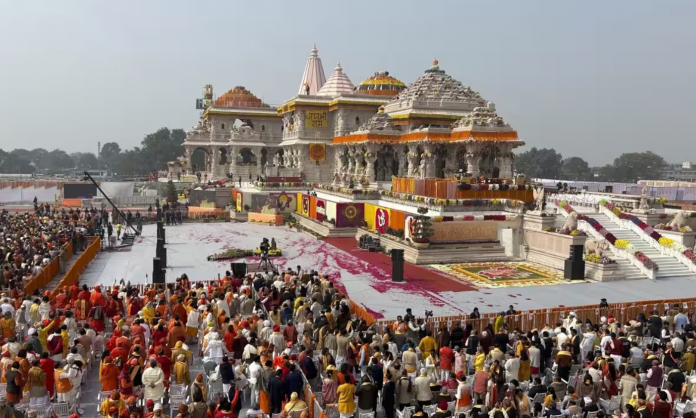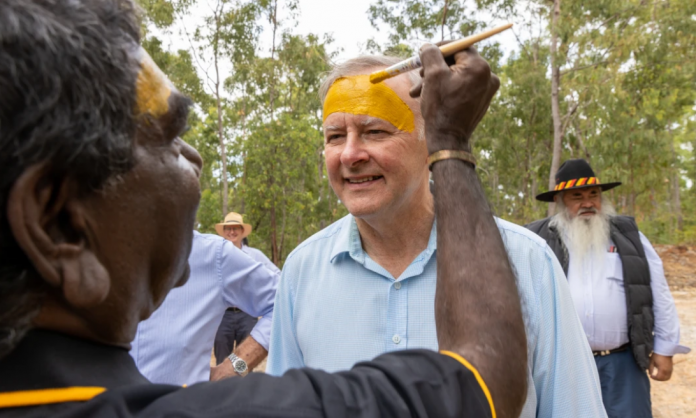In the wake of the victory of the No campaign in the referendum, racists and right-wingers of all sorts have taken special delight pointing out that many Labor-voting working-class suburban electorates voted No.
This is proof, they hope, that they can drive politics to the right and return the Liberals to power. Their tools of trade haven’t changed since the 1990s. Vicious attacks on unions, workers’ living standards and social services are accompanied by all manner of hate and fear campaigns.
One of the questions this raises for the left is: What would an effective mass anti-racist campaign look like?
It’s clear that such a project wouldn’t look anything like the Yes campaign we’ve just seen. Delivering vacuous, forgettable dot-points about “fairness” through a letterbox or social media ad is going to struggle to cut through with many working-class people—especially during a cost-of-living crisis.
Labor members of parliament were clearly aware of the problem. A month before the referendum, the Australian Financial Review reported that Labor MPs were refusing to campaign for Yes, fearful of getting hammered over the government’s abject failure to address the cost-of-living crisis. According to the AFR, one MP “expressed dread at knocking on doors to press constituents about the Voice when petrol was back over $2.20 a litre”.
Of course, shrinking away from encounters like this isn’t the only possible response. In fact, it’s pretty straightforward to address economic concerns directly—and connect them to anti-racist politics.
Anyone who has campaigned for Victorian Socialists has no doubt had this sort of conversation at some point. Many people will happily weigh in on the crimes of the billionaires and their political servants, but express misgivings about our policy of welcoming refugees and migrants, or other political issues such as defending rights for trans people. In my experience, the only response that can cut through is to talk the language of class:
“Well, we’ve just been talking about the billionaires and how they rip us all off. In my opinion, one of the ways they get away with this is through ‘divide and conquer’: ‘No job security? Wages falling behind inflation? No bulk-billing doctor? Don’t blame me—I’m just the richest person in the country! Instead, why don’t you blame ... that refugee, that Aboriginal person, that Muslim over there’.”
Of course, this is only the start of any serious discussion of racism. But it’s clear that an approach like this can connect with a life experience that is structured by class. Many times I’ve had people thank me, and say that they’ve never thought of racism—or politics—in that way before.
It’s an indictment of Labor and the union movement, and the Greens for that matter, that a straightforward explanation of racism as a tool of the rich and powerful is so rare in Australian political life. Instead, racism is portrayed as a version of impoliteness, or of not caring enough, or of “ignorance”.
Anti-racism is all too often pitched as an appeal for people to “care more”. When this appeal is coming from a political establishment that self-evidently doesn’t care about working-class people, it can’t connect. And the political right can portray anti-racism as just some elitist snobbery of the “do-gooder middle classes”.
So, hypothetically, what might this approach have looked like for the intrepid political campaigner who knocked on doors despite petrol being above $2.20 per litre? Perhaps something like this:
“Yes, fossil fuel companies are jacking up their prices, piling up their profits, paying pretty much zero tax—and they’re also doing over Aboriginal people to grab their land. And not only that! Plenty of corporations and billionaires and politicians like Peter Dutton want us all thinking that Aboriginal people are the problem, when it’s the super-rich and the corporations who are the ones ripping us off. Don’t fall for the divide and conquer—we’re all getting done over by the rich, and we should be supporting each other, not letting Dutton divide us.”
But the Yes campaign could never talk like this, for two obvious reasons.
First was the weak, tokenistic nature of the Voice proposal itself. It was to be a powerless advisory body that could be ignored or restructured at the whim of the government, and it included no concrete measures that would actually assist Aboriginal people in their struggles for justice. This, after all, was the reason why significant parts of Australia’s corporate elite supported the Voice proposal.
Second, the Labor Party finds it difficult to speak in class terms (and wouldn’t get taken seriously if it did) because it has spent decades introducing and administering neoliberal “reforms” on behalf of the corporations and billionaires who dominate our society. The Greens also, despite dabbling in talk about the billionaires in recent years, aren’t the sort of party that talks consistently in the language of class.
Along with taking class politics seriously, any effective anti-racist campaign would have to acknowledge that it is, um, a campaign against racism. This point might be thought so obvious it shouldn’t need saying. But the official Yes campaign was so timid it refused even to acknowledge the issue. In fact, the opposite was the case—for instance when the campaign left Marcia Langton isolated after she pointed out the obvious racism of the Liberal/National-led No campaign.
In the late 1990s, Pauline Hanson did an enormous favour to the ruling class and the political right in this country by reintroducing plainly racist language into Australian political life for the first time in a generation. A lively campaign of protests had a measurable impact in reducing her electoral support, especially in Victoria. It would have been impossible to have this impact if we’d never called her ideas racist and asked people to rally against them on that basis.
Solidarity is enlightened self-interest: the realisation that if I want to win against the billionaires, the corporate elites and their political servants, I have to help you win.
The referendum is gone, and the Voice along with it. But if we want to challenge the deep roots of racism in Australian society, we have to be able to call out racism when we see it—and talk in the language of class to challenge it.










